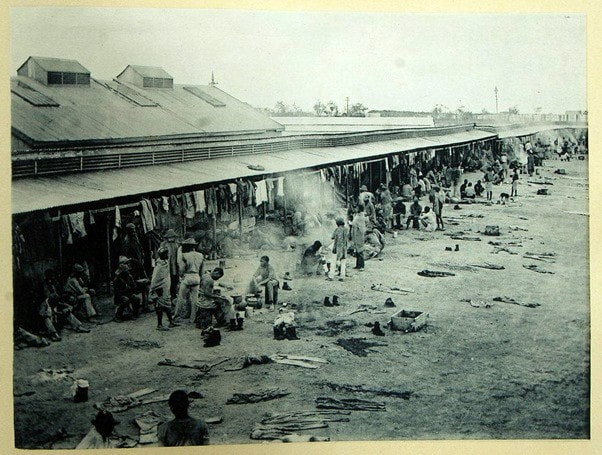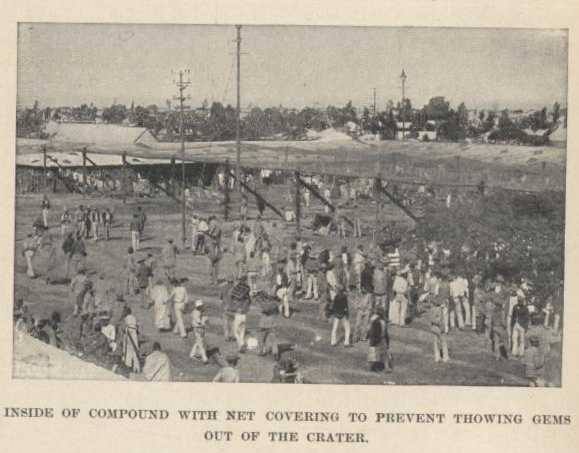Today in Kimberley's History
|
|
|
|
The French Company open the first closed compound for mineworkers in Kimberley - 1885
The very first closed compound for black mineworkers was opened officially on Saturday 17 January 1885 by the French Company who were based at the Kimberley Mine. The company marched 110 black mineworkers into the compound from which they were not to leave for six months. Barney Barnato’s Kimberley Central Diamond Mining Company opened their compound for black mineworkers on 27 April 1885. Yet another two mining companies in Kimberley had compounds in use by 1885, both based at the Bultfontein Mine - the Hatton Company and the Bultfontein Mining Company - as stated in the Griqua West Diamond Mine Inspector's annual report.
(Courtesy Steve Lunderstedt, Kimberley Calls...and Recalls)
The very first closed compound for black mineworkers was opened officially on Saturday 17 January 1885 by the French Company who were based at the Kimberley Mine. The company marched 110 black mineworkers into the compound from which they were not to leave for six months. Barney Barnato’s Kimberley Central Diamond Mining Company opened their compound for black mineworkers on 27 April 1885. Yet another two mining companies in Kimberley had compounds in use by 1885, both based at the Bultfontein Mine - the Hatton Company and the Bultfontein Mining Company - as stated in the Griqua West Diamond Mine Inspector's annual report.
(Courtesy Steve Lunderstedt, Kimberley Calls...and Recalls)
94 days since beginning of the Siege of Kimberley, 1900
Extract from "The Diary of a Doctor's Wife – During the Siege of Kimberley October 1899 to February 1900" by Winifred Heberden.
Jack went out very early this morning with his Ambulance men and the troops, and they got within shelling distance of the Boers at Tollpan towards Olifantsfontein before the enemy discovered them. The D.F.A. dropped many shells into their laager, from which they doubled round to try and get into their trenches, where, however, one of our Maxims opened upon them, driving them back with much confusion and probably some loss.
A Boer hoisted a piece of white rag on the end of a whip, but as his companions continued firing the Maxim turned on the sham flag of truce, and it disappeared. Even when our men were retiring, the Boers, though their practice was excellent, had no luck, some of their shells not exploding at all. Jack's only 'case' was an artillery man who fell over his gun at the beginning of the sortie in a fit, and broke his nose!
Shelling of the town was going on in other parts of Kimberley at 7 a.m., and though the Boers must have fired quite 50 shells at us before breakfast, no harm was done anywhere.
In the afternoon we went to some excellent sports at the Artillery Camp, and much enjoyed some delicious large peaches and grapes sent by Mr Rhodes to the Officers' Mess Room, where tea, and drinks for the men were also provided.
Apropos of the latter, whisky has now quite disappeared in Kimberley as did French brandy some time ago, though a few gentlemen manage to produce a little on special occasions from some inner chamber known only to themselves! We still get Cape brandy, soda water, ginger-beer, and hop-beer; and the chemists make a compound they call 'Lime Juice'. Mr Labram, when implored at the Club to try and make them some whisky, instead of more guns, said he thought he might try with a few wood-shavings!
Amongst other interesting events at the Sports was the Tug-of-War on horse-back. The enormous horses of the R.A. and R.E. seemed to understand all about it and stood like rocks. The 'Dismounting Ordnance' to be accomplished against time, was quite the best thing of the day; and it much astonished the on-lookers to see how rapidly a gun could be unlimbered, taken off its wheels, and the gun and wheels carried aside, just as it has sometimes to be done on the field of battle.
Extract from "The Diary of a Doctor's Wife – During the Siege of Kimberley October 1899 to February 1900" by Winifred Heberden.
Jack went out very early this morning with his Ambulance men and the troops, and they got within shelling distance of the Boers at Tollpan towards Olifantsfontein before the enemy discovered them. The D.F.A. dropped many shells into their laager, from which they doubled round to try and get into their trenches, where, however, one of our Maxims opened upon them, driving them back with much confusion and probably some loss.
A Boer hoisted a piece of white rag on the end of a whip, but as his companions continued firing the Maxim turned on the sham flag of truce, and it disappeared. Even when our men were retiring, the Boers, though their practice was excellent, had no luck, some of their shells not exploding at all. Jack's only 'case' was an artillery man who fell over his gun at the beginning of the sortie in a fit, and broke his nose!
Shelling of the town was going on in other parts of Kimberley at 7 a.m., and though the Boers must have fired quite 50 shells at us before breakfast, no harm was done anywhere.
In the afternoon we went to some excellent sports at the Artillery Camp, and much enjoyed some delicious large peaches and grapes sent by Mr Rhodes to the Officers' Mess Room, where tea, and drinks for the men were also provided.
Apropos of the latter, whisky has now quite disappeared in Kimberley as did French brandy some time ago, though a few gentlemen manage to produce a little on special occasions from some inner chamber known only to themselves! We still get Cape brandy, soda water, ginger-beer, and hop-beer; and the chemists make a compound they call 'Lime Juice'. Mr Labram, when implored at the Club to try and make them some whisky, instead of more guns, said he thought he might try with a few wood-shavings!
Amongst other interesting events at the Sports was the Tug-of-War on horse-back. The enormous horses of the R.A. and R.E. seemed to understand all about it and stood like rocks. The 'Dismounting Ordnance' to be accomplished against time, was quite the best thing of the day; and it much astonished the on-lookers to see how rapidly a gun could be unlimbered, taken off its wheels, and the gun and wheels carried aside, just as it has sometimes to be done on the field of battle.


